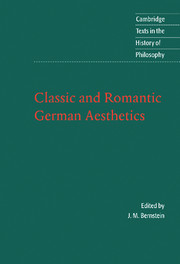Book contents
- Frontmatter
- Contents
- Introduction
- Chronology
- Further reading
- Note on the texts
- Aesthetica in nuce: A Rhapsody in Cabbalistic Prose (1762)
- Laocoön: An Essay on the Limits of Painting and Poetry (1766)
- From ‘On the Artistic Imitation of the Beautiful’ (1788)
- ‘Kallias or Concerning Beauty : Letters to Gottfried Körner’ (1793)
- ‘Oldest Programme for a System of German Idealism’ (1796)
- ‘Letter to Hegel, 26 January 1795’
- ‘Being Judgement Possibility’ (1795)
- ‘The Significance of Tragedy’ (1802)
- ‘Remarks on Oedipus’ (1803)
- From Miscellaneous Remarks (1797)
- ‘Monologue’
- ‘Dialogues’ (1798)
- ‘On Goethe’ (1798)
- ‘Studies in the Visual Arts’ (1799)
- From ‘Critical Fragments’ (1797)
- From ‘Athenaeum Fragments’ (1798)
- From ‘Ideas’ (1800)
- ‘On Goethe's Meister’ (1798)
- ‘Letter About the Novel’ (1799)
- ‘On Incomprehensibility’ (1800)
- Index
- Cambridge texts in the history of philosophy
‘Being Judgement Possibility’ (1795)
Published online by Cambridge University Press: 05 June 2012
- Frontmatter
- Contents
- Introduction
- Chronology
- Further reading
- Note on the texts
- Aesthetica in nuce: A Rhapsody in Cabbalistic Prose (1762)
- Laocoön: An Essay on the Limits of Painting and Poetry (1766)
- From ‘On the Artistic Imitation of the Beautiful’ (1788)
- ‘Kallias or Concerning Beauty : Letters to Gottfried Körner’ (1793)
- ‘Oldest Programme for a System of German Idealism’ (1796)
- ‘Letter to Hegel, 26 January 1795’
- ‘Being Judgement Possibility’ (1795)
- ‘The Significance of Tragedy’ (1802)
- ‘Remarks on Oedipus’ (1803)
- From Miscellaneous Remarks (1797)
- ‘Monologue’
- ‘Dialogues’ (1798)
- ‘On Goethe’ (1798)
- ‘Studies in the Visual Arts’ (1799)
- From ‘Critical Fragments’ (1797)
- From ‘Athenaeum Fragments’ (1798)
- From ‘Ideas’ (1800)
- ‘On Goethe's Meister’ (1798)
- ‘Letter About the Novel’ (1799)
- ‘On Incomprehensibility’ (1800)
- Index
- Cambridge texts in the history of philosophy
Summary
Being –, expresses the combination of subject and object.
Where subject and object simply are, and not just partially, united, such that no separation can take place without injuring the nature of that which is to be divided, only there and nowhere else can there be talk of being as such, the same is the case in intellectual intuition.
But this being must not be confused with identity. When I say: I am I, then the subject (I) and the object (I) are not combined in such a way that no separation can take place without injuring the nature of what is to be separated; on the contrary, the I is only possible through the separation of the I from the I. How can I say: I! without self-consciousness? But how is self-consciousness possible? By setting myself in opposition to myself, by separating myself from myself but, the separation notwithstanding, by being able to recognize myself in what opposes me. But in what sense as the same? I can, must ask this; for in another respect it is opposed to itself. Therefore identity is not a unification of object and subject, which can take place absolutely, therefore identity is not = to absolute being.
Judgement – is in the highest and most strict sense the original [ursprünglich] separation of the most tight unity of object and subject in intellectual intuition, that separation which makes object and subject first possible, the judgement [Ur – theilung, original – separation].
- Type
- Chapter
- Information
- Classic and Romantic German Aesthetics , pp. 191 - 192Publisher: Cambridge University PressPrint publication year: 2002
- 5
- Cited by



